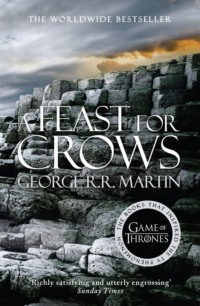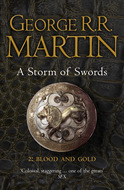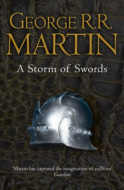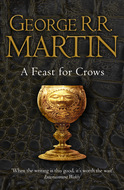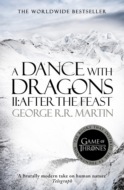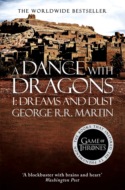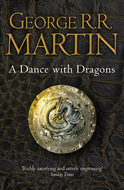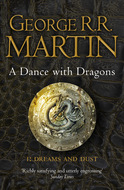Kitap dosya olarak indirilemez ancak uygulamamız üzerinden veya online olarak web sitemizden okunabilir.
Kitabı oku: «A Feast for Crows», sayfa 2
And beyond, where the Honeywine widened into Whispering Sound, rose the Hightower, its beacon fires bright against the dawn. From where it stood atop the bluffs of Battle Island, its shadow cut the city like a sword. Those born and raised in Oldtown could tell the time of day by where that shadow fell. Some claimed a man could see all the way to the Wall from the top. Perhaps that was why Lord Leyton had not made the descent in more than a decade, preferring to rule his city from the clouds.
A butcher’s cart rumbled past Pate down the river road, five piglets in the back squealing in distress. Dodging from its path, he just avoided being spattered as a townswoman emptied a pail of night soil from a window overhead. When I am a maester in a castle I will have a horse to ride, he thought. Then he tripped upon a cobble and wondered who he was fooling. There would be no chain for him, no seat at a lord’s high table, no tall white horse to ride. His days would be spent listening to ravens quork and scrubbing shit stains off Archmaester Walgrave’s smallclothes.
He was on one knee, trying to wipe the mud off his robes, when a voice said, “Good morrow, Pate.”
The alchemist was standing over him.
Pate rose. “The third day … you said you would be at the Quill and Tankard.”
“You were with your friends. It was not my wish to intrude upon your fellowship.” The alchemist wore a hooded traveler’s cloak, brown and nondescript. The rising sun was peeking over the rooftops behind his shoulder, so it was hard to make out the face beneath his hood. “Have you decided what you are?”
Must he make me say it? “I suppose I am a thief.”
“I thought you might be.”
The hardest part had been getting down on his hands and knees to pull the strongbox from underneath Archmaester Walgrave’s bed. Though the box was stoutly made and bound with iron, its lock was broken. Maester Gormon had suspected Pate of breaking it, but that wasn’t true. Walgrave had broken the lock himself, after losing the key that opened it.
Inside, Pate had found a bag of silver stags, a lock of yellow hair tied up in a ribbon, a painted miniature of a woman who resembled Walgrave (even to her mustache), and a knight’s gauntlet made of lobstered steel. The gauntlet had belonged to a prince, Walgrave claimed, though he could no longer seem to recall which one. When Pate shook it, the key fell out onto the floor.
If I pick that up, I am a thief, he remembered thinking. The key was old and heavy, made of black iron; supposedly it opened every door at the Citadel. Only the archmaesters had such keys. The others carried theirs upon their person or hid them away in some safe place, but if Walgrave had hidden his, no one would ever have seen it again. Pate snatched up the key and had been halfway to the door before turning back to take the silver too. A thief was a thief, whether he stole a little or a lot. “Pate,” one of the white ravens had called after him, “Pate, Pate, Pate.”
“Do you have my dragon?” he asked the alchemist.
“If you have what I require.”
“Give it here. I want to see.” Pate did not intend to let himself be cheated.
“The river road is not the place. Come.”
He had no time to think about it, to weigh his choices. The alchemist was walking away. Pate had to follow or lose Rosey and the dragon both, forever. He followed. As they walked, he slipped his hand up into his sleeve. He could feel the key, safe inside the hidden pocket he had sewn there. Maester’s robes were full of pockets. He had known that since he was a boy.
He had to hurry to keep pace with the alchemist’s longer strides. They went down an alley, around a corner, through the old Thieves Market, along Ragpicker’s Wynd. Finally, the man turned into another alley, narrower than the first. “This is far enough,” said Pate. “There’s no one about. We’ll do it here.”
“As you wish.”
“I want my dragon.”
“To be sure.” The coin appeared. The alchemist made it walk across his knuckles, the way he had when Rosey brought the two of them together. In the morning light the dragon glittered as it moved, and gave the alchemist’s fingers a golden glow.
Pate grabbed it from his hand. The gold felt warm against his palm. He brought it to his mouth and bit down on it the way he’d seen men do. If truth be told, he wasn’t sure what gold should taste like, but he did not want to look a fool.
“The key?” the alchemist inquired politely.
Something made Pate hesitate. “Is it some book you want?” Some of the old Valyrian scrolls down in the locked vaults were said to be the only surviving copies in the world.
“What I want is none of your concern.”
“No.” It’s done, Pate told himself. Go. Run back to the Quill and Tankard, wake Rosey with a kiss, and tell her she belongs to you. Yet still he lingered. “Show me your face.”
“As you wish.” The alchemist pulled his hood down.
He was just a man, and his face was just a face. A young man’s face, ordinary, with full cheeks and the shadow of a beard. A scar showed faintly on his right cheek. He had a hooked nose, and a mat of dense black hair that curled tightly around his ears. It was not a face Pate recognized. “I do not know you.”
“Nor I you.”
“Who are you?”
“A stranger. No one. Truly.”
“Oh.” Pate had run out of words. He drew out the key and put it in the stranger’s hand, feeling light-headed, almost giddy. Rosey, he reminded himself. “We’re done, then.”
He was halfway down the alley when the cobblestones began to move beneath his feet. The stones are slick and wet, he thought, but that was not it. He could feel his heart hammering in his chest. “What’s happening?” he said. His legs had turned to water. “I don’t understand.”
“And never will,” a voice said sadly.
The cobblestones rushed up to kiss him. Pate tried to cry for help, but his voice was failing too.
His last thought was of Rosey.
THE PROPHET
The prophet was drowning men on Great Wyk when they came to tell him that the king was dead.
It was a bleak, cold morning, and the sea was as leaden as the sky. The first three men had offered their lives to the Drowned God fearlessly, but the fourth was weak in faith and began to struggle as his lungs cried out for air. Standing waist-deep in the surf, Aeron seized the naked boy by the shoulders and pushed his head back down as he tried to snatch a breath. “Have courage,” he said. “We came from the sea, and to the sea we must return. Open your mouth and drink deep of god’s blessing. Fill your lungs with water, that you may die and be reborn. It does no good to fight.”
Either the boy could not hear him with his head beneath the waves, or else his faith had utterly deserted him. He began to kick and thrash so wildly that Aeron had to call for help. Four of his drowned men waded out to seize the wretch and hold him underwater. “Lord God who drowned for us,” the priest prayed, in a voice as deep as the sea, “let Emmond your servant be reborn from the sea, as you were. Bless him with salt, bless him with stone, bless him with steel.”
Finally, it was done. No more air was bubbling from his mouth, and all the strength had gone out of his limbs. Facedown in the shallow sea floated Emmond, pale and cold and peaceful.
That was when the Damphair realized that three horsemen had joined his drowned men on the pebbled shore. Aeron knew the Sparr, a hatchet-faced old man with watery eyes whose quavery voice was law on this part of Great Wyk. His son Steffarion accompanied him, with another youth whose dark red fur-lined cloak was pinned at the shoulder with an ornate brooch that showed the black-and-gold warhorn of the Goodbrothers. One of Gorold’s sons, the priest decided at a glance. Three tall sons had been born to Goodbrother’s wife late in life, after a dozen daughters, and it was said that no man could tell one son from the others. Aeron Damphair did not deign to try. Whether this be Greydon or Gormond or Gran, the priest had no time for him.
He growled a brusque command, and his drowned men seized the dead boy by his arms and legs to carry him above the tideline. The priest followed, naked but for a sealskin clout that covered his private parts. Goosefleshed and dripping, he splashed back onto land, across cold wet sand and sea-scoured pebbles. One of his drowned men handed him a robe of heavy roughspun dyed in mottled greens and blues and greys, the colors of the sea and the Drowned God. Aeron donned the robe and pulled his hair free. Black and wet, that hair; no blade had touched it since the sea had raised him up. It draped his shoulders like a ragged, ropy cloak, and fell down past his waist. Aeron wove strands of seaweed through it, and through his tangled, uncut beard.
His drowned men formed a circle around the dead boy, praying. Norjen worked his arms whilst Rus knelt astride him, pumping on his chest, but all moved aside for Aeron. He pried apart the boy’s cold lips with his fingers and gave Emmond the kiss of life, and again, and again, until the sea came gushing from his mouth. The boy began to cough and spit, and his eyes blinked open, full of fear.
Another one returned. It was a sign of the Drowned God’s favor, men said. Every other priest lost a man from time to time, even Tarle the Thrice-Drowned, who had once been thought so holy that he was picked to crown a king. But never Aeron Greyjoy. He was the Damphair, who had seen the god’s own watery halls and returned to tell of it. “Rise,” he told the sputtering boy as he slapped him on his naked back. “You have drowned and been returned to us. What is dead can never die.”
“But rises.” The boy coughed violently, bringing up more water. “Rises again.” Every word was bought with pain, but that was the way of the world; a man must fight to live. “Rises again.” Emmond staggered to his feet. “Harder. And stronger.”
“You belong to the god now,” Aeron told him. The other drowned men gathered round and each gave him a punch and a kiss to welcome him to the brotherhood. One helped him don a roughspun robe of mottled blue and green and grey. Another presented him with a driftwood cudgel. “You belong to the sea now, so the sea has armed you,” Aeron said. “We pray that you shall wield your cudgel fiercely, against all the enemies of our god.”
Only then did the priest turn to the three riders, watching from their saddles. “Have you come to be drowned, my lords?”
The Sparr coughed. “I was drowned as a boy,” he said, “and my son upon his name day.”
Aeron snorted. That Steffarion Sparr had been given to the Drowned God soon after birth he had no doubt. He knew the manner of it too, a quick dip into a tub of seawater that scarce wet the infant’s head. Small wonder the ironborn had been conquered, they who once held sway everywhere the sound of waves was heard. “That is no true drowning,” he told the riders. “He that does not die in truth cannot hope to rise from death. Why have you come, if not to prove your faith?”
“Lord Gorold’s son came seeking you, with news.” The Sparr indicated the youth in the red cloak.
The boy looked to be no more than six-and-ten. “Aye, and which are you?” Aeron demanded.
“Gormond. Gormond Goodbrother, if it please my lord.”
“It is the Drowned God we must please. Have you been drowned, Gormond Goodbrother?”
“On my name day, Damphair. My father sent me to find you and bring you to him. He needs to see you.”
“Here I stand. Let Lord Gorold come and feast his eyes.” Aeron took a leather skin from Rus, freshly filled with water from the sea. The priest pulled out the cork and took a swallow.
“I am to bring you to the keep,” insisted young Gormond, from atop his horse.
He is afraid to dismount, lest he get his boots wet. “I have the god’s work to do.” Aeron Greyjoy was a prophet. He did not suffer petty lords ordering him about like some thrall.
“Gorold’s had a bird,” said the Sparr.
“A maester’s bird, from Pyke,” Gormond confirmed.
Dark wings, dark words. “The ravens fly o’er salt and stone. If there are tidings that concern me, speak them now.”
“Such tidings as we bear are for your ears alone, Damphair,” the Sparr said. “These are not matters I would speak of here before these others.”
“These others are my drowned men, god’s servants, just as I am. I have no secrets from them, nor from our god, beside whose holy sea I stand.”
The horsemen exchanged a look. “Tell him,” said the Sparr, and the youth in the red cloak summoned up his courage. “The king is dead,” he said, as plain as that. Four small words, yet the sea itself trembled when he uttered them.
Four kings there were in Westeros, yet Aeron did not need to ask which one was meant. Balon Greyjoy ruled the Iron Islands, and no other. The king is dead. How can that be? Aeron had seen his eldest brother not a moon’s turn past, when he had returned to the Iron Islands from harrying the Stony Shore. Balon’s grey hair had gone half-white whilst the priest had been away, and the stoop in his shoulders was more pronounced than when the longships sailed. Yet all in all the king had not seemed ill.
Aeron Greyjoy had built his life upon two mighty pillars. Those four small words had knocked one down. Only the Drowned God remains to me. May he make me as strong and tireless as the sea. “Tell me the manner of my brother’s death.”
“His Grace was crossing a bridge at Pyke when he fell and was dashed upon the rocks below.”
The Greyjoy stronghold stood upon a broken headland, its keeps and towers built atop massive stone stacks that thrust up from the sea. Bridges knotted Pyke together; arched bridges of carved stone and swaying spans of hempen rope and wooden planks. “Was the storm raging when he fell?” Aeron demanded of them.
“Aye,” the youth said, “it was.”
“The Storm God cast him down,” the priest announced. For a thousand thousand years sea and sky had been at war. From the sea had come the ironborn, and the fish that sustained them even in the depths of winter, but storms brought only woe and grief. “My brother Balon made us great again, which earned the Storm God’s wrath. He feasts now in the Drowned God’s watery halls, with mermaids to attend his every want. It shall be for us who remain behind in this dry and dismal vale to finish his great work.” He pushed the cork back into his waterskin. “I shall speak with your lord father. How far from here to Hammerhorn?”
“Six leagues. You may ride pillion with me.”
“One can ride faster than two. Give me your horse, and the Drowned God will bless you.”
“Take my horse, Damphair,” offered Steffarion Sparr.
“No. His mount is stronger. Your horse, boy.”
The youth hesitated half a heartbeat, then dismounted and held the reins for the Damphair. Aeron shoved a bare black foot into a stirrup and swung himself onto the saddle. He was not fond of horses – they were creatures from the green lands and helped to make men weak – but necessity required that he ride. Dark wings, dark words. A storm was brewing, he could hear it in the waves, and storms brought naught but evil. “Meet with me at Pebbleton beneath Lord Merlyn’s tower,” he told his drowned men, as he turned the horse’s head.
The way was rough, up hills and woods and stony defiles, along a narrow track that oft seemed to disappear beneath the horse’s hooves. Great Wyk was the largest of the Iron Islands, so vast that some of its lords had holdings that did not front upon the holy sea. Gorold Goodbrother was one such. His keep was in the Hardstone Hills, as far from the Drowned God’s realm as any place in the isles. Gorold’s folk toiled down in Gorold’s mines, in the stony dark beneath the earth. Some lived and died without setting eyes upon salt water. Small wonder that such folk are crabbed and queer.
As Aeron rode, his thoughts turned to his brothers.
Nine sons had been born from the loins of Quellon Greyjoy, the Lord of the Iron Islands. Harlon, Quenton, and Donel had been born of Lord Quellon’s first wife, a woman of the Stonetrees. Balon, Euron, Victarion, Urrigon, and Aeron were the sons of his second, a Sunderly of Saltcliffe. For a third wife, Quellon took a girl from the green lands, who gave him a sickly idiot boy named Robin, the brother best forgotten. The priest had no memory of Quenton or Donel, who had died as infants. Harlon he recalled but dimly, sitting grey-faced and still in a windowless tower room and speaking in whispers that grew fainter every day as the greyscale turned his tongue and lips to stone. One day we shall feast on fish together in the Drowned God’s watery halls, the four of us and Urri too.
Nine sons had been born from the loins of Quellon Greyjoy, but only four had lived to manhood. That was the way of this cold world, where men fished the sea and dug in the ground and died, whilst women brought forth short-lived children from beds of blood and pain. Aeron had been the last and least of the four krakens, Balon the eldest and boldest, a fierce and fearless boy who lived only to restore the ironborn to their ancient glory. At ten he scaled the Flint Cliffs to the Blind Lord’s haunted tower. At thirteen he could run a longship’s oars and dance the finger dance as well as any man in the isles. At fifteen he had sailed with Dagmer Cleftjaw to the Stepstones and spent a summer reaving. He slew his first man there and took his first two salt wives. At seventeen Balon captained his own ship. He was all that an elder brother ought to be, though he had never shown Aeron aught but scorn. I was weak and full of sin, and scorn was more than I deserved. Better to be scorned by Balon the Brave than beloved of Euron Crow’s Eye. And if age and grief had turned Balon bitter with the years, they had also made him more determined than any man alive. He was born a lord’s son and died a king, murdered by a jealous god, Aeron thought, and now the storm is coming, a storm such as these isles have never known.
It was long after dark by the time the priest espied the spiky iron battlements of the Hammerhorn clawing at the crescent moon. Gorold’s keep was hulking and blocky, its great stones quarried from the cliff that loomed behind it. Below its walls, the entrances of caves and ancient mines yawned like toothless black mouths. The Hammerhorn’s iron gates had been closed and barred for the night. Aeron beat on them with a rock until the clanging woke a guard.
The youth who admitted him was the image of Gormond, whose horse he’d taken. “Which one are you?” Aeron demanded.
“Gran. My father awaits you within.”
The hall was dank and drafty, full of shadows. One of Gorold’s daughters offered the priest a horn of ale. Another poked at a sullen fire that was giving off more smoke than heat. Gorold Goodbrother himself was talking quietly with a slim man in fine grey robes, who wore about his neck a chain of many metals that marked him for a maester of the Citadel.
“Where is Gormond?” Gorold asked when he saw Aeron.
“He returns afoot. Send your women away, my lord. And the maester as well.” He had no love of maesters. Their ravens were creatures of the Storm God, and he did not trust their healing, not since Urri. No proper man would choose a life of thralldom, nor forge a chain of servitude to wear about his throat.
“Gysella, Gwin, leave us,” Goodbrother said curtly. “You as well, Gran. Maester Murenmure will stay.”
“He will go,” insisted Aeron.
“This is my hall, Damphair. It is not for you to say who must go and who remains. The maester stays.”
The man lives too far from the sea, Aeron told himself. “Then I shall go,” he told Goodbrother. Dry rushes rustled underneath the cracked soles of his bare black feet as he turned and stalked away. It seemed he had ridden a long way for naught.
Aeron was almost at the door when the maester cleared his throat, and said, “Euron Crow’s Eye sits the Seastone Chair.”
The Damphair turned. The hall had suddenly grown colder. The Crow’s Eye is half a world away. Balon sent him off two years ago, and swore that it would be his life if he returned. “Tell me,” he said hoarsely.
“He sailed into Lordsport the day after the king’s death, and claimed the castle and the crown as Balon’s eldest brother,” said Gorold Goodbrother. “Now he sends forth ravens, summoning the captains and the kings from every isle to Pyke, to bend their knees and do him homage as their king.”
“No.” Aeron Damphair did not weigh his words. “Only a godly man may sit the Seastone Chair. The Crow’s Eye worships naught but his own pride.”
“You were on Pyke not long ago, and saw the king,” said Goodbrother. “Did Balon say aught to you of the succession?”
Aye. They had spoken in the Sea Tower, as the wind howled outside the windows and the waves crashed restlessly below. Balon had shaken his head in despair when he heard what Aeron had to tell him of his last remaining son. “The wolves have made a weakling of him, as I feared,” the king had said. “I pray god that they killed him, so he cannot stand in Asha’s way.” That was Balon’s blindness; he saw himself in his wild, headstrong daughter, and believed she could succeed him. He was wrong in that, and Aeron tried to tell him so. “No woman will ever rule the ironborn, not even a woman such as Asha,” he insisted, but Balon could be deaf to things he did not wish to hear.
Before the priest could answer Gorold Goodbrother, the maester’s mouth flapped open once again. “By rights the Seastone Chair belongs to Theon, or Asha if the prince is dead. That is the law.”
“Green land law,” said Aeron with contempt. “What is that to us? We are ironborn, the sons of the sea, chosen of the Drowned God. No woman may rule over us, nor any godless man.”
“And Victarion?” asked Gorold Goodbrother. “He has the Iron Fleet. Will Victarion make a claim, Damphair?”
“Euron is the elder brother …” began the maester.
Aeron silenced him with a look. In little fishing towns and great stone keeps alike such a look from Damphair would make maids feel faint and send children shrieking to their mothers, and it was more than sufficient to quell the chain-neck thrall. “Euron is elder,” the priest said, “but Victarion is more godly.”
“Will it come to war between them?” asked the maester.
“Ironborn must not spill the blood of ironborn.”
“A pious sentiment, Damphair,” said Goodbrother, “but not one that your brother shares. He had Sawane Botley drowned for saying that the Seastone Chair by rights belonged to Theon.”
“If he was drowned, no blood was shed,” said Aeron.
The maester and the lord exchanged a look. “I must send word to Pyke, and soon,” said Gorold Goodbrother. “Damphair, I would have your counsel. What shall it be, homage or defiance?”
Aeron tugged his beard, and thought. I have seen the storm, and its name is Euron Crow’s Eye. “For now, send only silence,” he told the lord. “I must pray on this.”
“Pray all you wish,” the maester said. “It does not change the law. Theon is the rightful heir, and Asha next.”
“Silence!” Aeron roared. “Too long have the ironborn listened to you chain-neck maesters prating of the green lands and their laws. It is time we listened to the sea again. It is time we listened to the voice of god.” His own voice rang in that smoky hall, so full of power that neither Gorold Goodbrother nor his maester dared a reply. The Drowned God is with me, Aeron thought. He has shown me the way.
Goodbrother offered him the comforts of the castle for the night, but the priest declined. He seldom slept beneath a castle roof, and never so far from the sea. “Comforts I shall know in the Drowned God’s watery halls beneath the waves. We are born to suffer, that our sufferings might make us strong. All that I require is a fresh horse to carry me to Pebbleton.”
That Goodbrother was pleased to provide. He sent his son Greydon as well, to show the priest the shortest way through the hills down to the sea. Dawn was still an hour off when they set forth, but their mounts were hardy and surefooted, and they made good time despite the darkness. Aeron closed his eyes and said a silent prayer, and after a while began to drowse in the saddle.
The sound came softly, the scream of a rusted hinge. “Urri,” he muttered, and woke, fearful. There is no hinge here, no door, no Urri. A flying axe took off half of Urri’s hand when he was ten-and-four, playing at the finger dance whilst his father and his elder brothers were away at war. Lord Quellon’s third wife had been a Piper of Pinkmaiden Castle, a girl with big soft breasts and brown doe’s eyes. Instead of healing Urri’s hand the Old Way, with fire and seawater, she gave him to her green land maester, who swore that he could sew back the missing fingers. He did that, and later he used potions and poultices and herbs, but the hand mortified and Urri took a fever. By the time the maester sawed his arm off, it was too late.
Lord Quellon never returned from his last voyage; the Drowned God in his goodness granted him a death at sea. It was Lord Balon who came back, with his brothers Euron and Victarion. When Balon heard what had befallen Urri, he removed three of the maester’s fingers with a cook’s cleaver and sent his father’s Piper wife to sew them back on. Poultices and potions worked as well for the maester as they had for Urrigon. He died raving, and Lord Quellon’s third wife followed soon thereafter, as the midwife drew a stillborn daughter from her womb. Aeron had been glad. It had been his axe that sheared off Urri’s hand, whilst they danced the finger dance together, as friends and brothers will.
It shamed him still to recall the years that followed Urri’s death. At six-and-ten he called himself a man, but in truth he had been a sack of wine with legs. He would sing, he would dance (but not the finger dance, never again), he would jape and jabber and make mock. He played the pipes, he juggled, he rode horses, and could drink more than all the Wynches and the Botleys, and half the Harlaws too. The Drowned God gives every man a gift, even him; no man could piss longer or farther than Aeron Greyjoy, as he proved at every feast. Once he bet his new longship against a herd of goats that he could quench a hearthfire with no more than his cock. Aeron feasted on goat for a year, and named the longship Golden Storm, though Balon threatened to hang him from her mast when he heard what sort of ram his brother proposed to mount upon her prow.
In the end, the Golden Storm went down off Fair Isle during Balon’s first rebellion, cut in half by a towering war galley called Fury when Stannis Baratheon caught Victarion in his trap and smashed the Iron Fleet. Yet the god was not done with Aeron, and carried him to shore. Some fishermen took him captive and marched him down to Lannisport in chains, and he spent the rest of the war in the bowels of Casterly Rock, proving that krakens can piss farther and longer than lions, boars, or chickens.
That man is dead. Aeron had drowned and been reborn from the sea, the god’s own prophet. No mortal man could frighten him, no more than the darkness could … nor memories, the bones of the soul. The sound of a door opening, the scream of a rusted iron hinge. Euron has come again. It did not matter. He was the Damphair priest, beloved of the god.
“Will it come to war?” asked Greydon Goodbrother as the sun was lightening the hills. “A war of brother against brother?”
“If the Drowned God wills it. No godless man may sit the Seastone Chair.” The Crow’s Eye will fight, that is certain. No woman could defeat him, not even Asha; women were made to fight their battles in the birthing bed. And Theon, if he lived, was just as hopeless, a boy of sulks and smiles. At Winterfell he proved his worth, such that it was, but the Crow’s Eye was no crippled boy. The decks of Euron’s ship were painted red, to better hide the blood that soaked them. Victarion. The king must be Victarion, or the storm will slay us all.
Greydon left him when the sun was up, to take the news of Balon’s death to his cousins in their towers at Downdelving, Crow Spike Keep, and Corpse Lake. Aeron continued on alone, up hills and down vales along a stony track that drew wider and more traveled as he neared the sea. In every village he paused to preach, and in the yards of petty lords as well. “We were born from the sea, and to the sea we all return,” he told them. His voice was as deep as the ocean, and thundered like the waves. “The Storm God in his wrath plucked Balon from his castle and cast him down, and now he feasts beneath the waves in the Drowned God’s watery halls.” He raised his hands. “Balon is dead! The king is dead! Yet a king will come again! For what is dead may never die, but rises again, harder and stronger! A king will rise!”
Some of those who heard him threw down their hoes and picks to follow, so by the time he heard the crash of waves a dozen men walked behind his horse, touched by god and desirous of drowning.
Pebbleton was home to several thousand fisherfolk, whose hovels huddled round the base of a square towerhouse with a turret at each corner. Twoscore of Aeron’s drowned men there awaited him, camped along a grey sand beach in sealskin tents and shelters built of driftwood. Their hands were roughened by brine, scarred by nets and lines, callused from oars and picks and axes, but now those hands gripped driftwood cudgels hard as iron, for the god had armed them from his arsenal beneath the sea.
They had built a shelter for the priest just above the tideline. Gladly, he crawled into it, after he had drowned his newest followers. My god, he prayed, speak to me in the rumble of the waves, and tell me what to do. The captains and the kings await your word. Who shall be our king in Balon’s place? Sing to me in the language of leviathan, that I may know his name. Tell me, O Lord beneath the waves, who has the strength to fight the storm on Pyke?
Though his ride to Hammerhorn had left him weary, Aeron Damphair was restless in his driftwood shelter, roofed over with black weeds from the sea. The clouds rolled in to cloak the moon and stars, and the darkness lay as thick upon the sea as it did upon his soul. Balon favored Asha, the child of his body, but a woman cannot rule the ironborn. It must be Victarion. Nine sons had been born from the loins of Quellon Greyjoy, and Victarion was the strongest of them, a bull of a man, fearless and dutiful. And therein lies our danger. A younger brother owes obedience to an elder, and Victarion was not a man to sail against tradition. He has no love for Euron, though. Not since the woman died.
